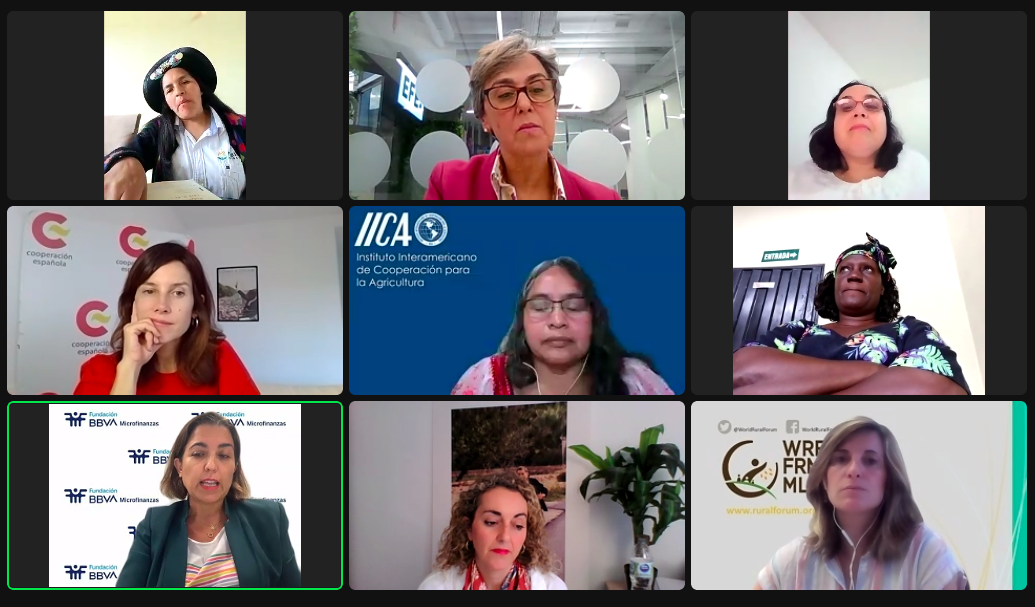Lorena Valdez, of Ecuador, and Haydée Anccasi, of Peru, recounted their experiences in a roundtable discussion organized by IICA, AECID and EFE to commemorate International Day of Rural Women.

Madrid, 18 October 2022 (IICA).- On the eve of the October 15 celebration of International Day of Rural Women (IICA), the Inter-American Institute for Cooperation on Agriculture (IICA), the Spanish Agency for International Development Cooperation (AECID) and the news agency, EFE, organized a virtual roundtable to give voice to women leaders and role models from the rural areas of the Americas. The 58 million women in these areas produce 51% of the food consumed in the region.
The colloquium was entitled “Rural Women in the Americas: Safeguarding Food Security and Rural Development” and among the panelists were Lorena Valdez, a rural cocoa entrepreneur from Esmeraldas, Ecuador, who is President of the Afro-descendant women’s association, Asociación de Mujeres Afroecuatorianas Timbiré en el Futuro (AMATIF); and the Peruvian Haydeé Anccasi, an Andean farmer who founded the Farinka Organics brand that grows, mass produces and markets maca, an ancient plant, native to Peru, that is considered a super food. This year, both women were recognized as IICA Leaders of Rurality.
Other participants included Annabella Moreno Alvarado, a Mexican women who founded a network for Mayan-speaking women, Red de 100 Mujeres Maya Hablantes del Sur del Estado de Yucatán; Charo Gasca, Director of EFE Internacional, who was the moderator; Antón Leis, Director of AECID; Soraya Villarroya, Coordinator of IICA’s Permanent Office for Europe; and Manuel Otero, Director General of the Institute.
Each rural leader spoke of the advances and challenges of the projects that they manage and how the projects are benefitting and impacting the lives of women in their communities.
Lorena Valdez explained that, “We are an organization of 27 female cocoa producers. All of us are rural women and all of us are Afro-descendants. Through tireless work, we have been able to support ourselves, as a collective, for 15 years now. We consider our rural background to be a privilege, as we are the heart of the economy and of food security. Food will always be on our tables”.
“Without a doubt, sustainable agriculture is the answer in these times of crises that we are experiencing and rural women are a key part of the development of the countries and of the entire Latin America”, added Valdez, who was the beneficiary of one of IICA’s technical cooperation projects in her country in 2020.
Speaking from Peru, Haydée Ancassi said that, “Mothers and farmers – when we sow and reap, we aim to protect and thank Mother Earth. From five in the morning, we are working in the fields, at an altitude of 4,500 meters, cultivating maca for 9 months. Later, we take it to another area for drying, where we expose it to sun and wind, so it can absorb the nutrients. Finally, we process it, and thanks to Farinka we are able to distribute it”.
Ancassi appealed to the participants to protect the planet: “Let us take care of Pachamama, the environment, to feed our families and the world”.
From Mexico, Annabella Moreno spoke of obstacles that must be overcome to increase the inclusion of rural women, remarking that, “The greatest hurdle is the financial part. That is why it is so important for public policies to bridge these gaps and to ensure that women have access to financing, among other things. Education is also key to rural development – allowing women to access training and scholarships that will help them to achieve their goals”.
Manuel Otero was emphatic in pointing out that, “There is only one antidote against food insecurity: sustainable agriculture and rural development; and among other elements, this antidote has three ingredients: the leadership, capacities and potential of rural women”.
For his part, the AECID Director maintained that, “Empowering these women is the only way that we will be able to reduce the gender gap, tackle food insecurity and resolve the problems of inequality and exclusion. Hunger is not a technical problem; it is a political problem”.
Lourdes Ortiz, IICA Inclusion and Rural Development Specialist in Guatemala was another panelist. In her view, the region should spearhead the development of local associations to increase the visibility of women’s contribution to the planet’s food and nutritional security and to its sustainable development, as well as to activate and ensure the sustainability of processes. Also important is the creation of partnerships and networks, with a view to influencing public policy.
Revisit the roundtable discussion HERE:
https://www.facebook.com/IICAnoticias/videos/400182778984080
More information:
Institutional Communication Division.
comunicacion.institucional@iica.int











